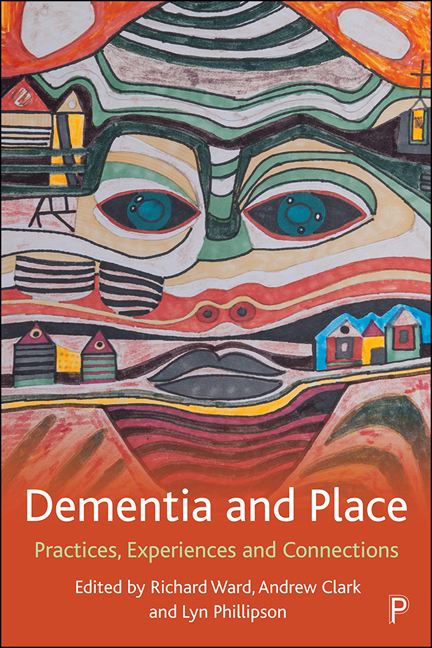Book contents
- Frontmatter
- Dedication
- Contents
- List of figures and tables
- Notes on contributors
- Acknowledgements
- 1 Introduction: Placing dementia
- 2 Understanding the meaning of neighbourhoods for people living with dementia: the value of a relational lens
- 3 Moving house with dementia
- 4 How do people with dementia manage problematic situations in public spaces?
- 5 Making and maintaining neighbourhood connections when living alone with dementia
- 6 My neighbourhood, my future ...?
- 7 Enabling the neighbourhood: a case for rethinking dementia-friendly communities
- 8 A conceptual framework of the person– environment interaction in the neighbourhood among persons living with dementia: a focus on out-of-home mobility
- 9 We’re known as ‘the girls’ around town: support, isolation and belonging for a lesbian couple living with dementia
- 10 Building community capacity for dementia in Canada: new directions in new places
- 11 The good, the challenging and the supportive: mapping life with dementia in the community
- 12 Growing back into community: changes through life with dementia
- 13 Dementia, tourism and leisure: making the visitor economy dementia friendly
- 14 Conclusion: Dementia emplaced
- Index
3 - Moving house with dementia
Published online by Cambridge University Press: 13 May 2022
- Frontmatter
- Dedication
- Contents
- List of figures and tables
- Notes on contributors
- Acknowledgements
- 1 Introduction: Placing dementia
- 2 Understanding the meaning of neighbourhoods for people living with dementia: the value of a relational lens
- 3 Moving house with dementia
- 4 How do people with dementia manage problematic situations in public spaces?
- 5 Making and maintaining neighbourhood connections when living alone with dementia
- 6 My neighbourhood, my future ...?
- 7 Enabling the neighbourhood: a case for rethinking dementia-friendly communities
- 8 A conceptual framework of the person– environment interaction in the neighbourhood among persons living with dementia: a focus on out-of-home mobility
- 9 We’re known as ‘the girls’ around town: support, isolation and belonging for a lesbian couple living with dementia
- 10 Building community capacity for dementia in Canada: new directions in new places
- 11 The good, the challenging and the supportive: mapping life with dementia in the community
- 12 Growing back into community: changes through life with dementia
- 13 Dementia, tourism and leisure: making the visitor economy dementia friendly
- 14 Conclusion: Dementia emplaced
- Index
Summary
My name is Jill. I married my husband, Dominic, in 1975. He was 46 and I was 29. We had two children in 1976 and 1979. Dominic was a dentist and somewhat eccentric, so we have never been Mr & Mrs Average. He retired in 1996 aged 65. He was diagnosed with Alzheimer's in 2003 and had a diagnosis earlier than most. Perhaps because of his medical training Dominic was aware early on something was not right – as was I. He was initially prescribed Aricept. He stayed on this for a few months but became dizzy and nauseous so stopped taking it. He has taken no medication since then and his dementia has developed relatively slowly. He is now 91. In 2019 we moved to a new house. I didn't tell Dominic about the move as I thought it might distress him. This record is written very much from my perspective and is not necessarily an example of ‘good practice’ for others to follow. It is simply my account of what it was like for me to move house with a partner who had been living with dementia for 17 years.
One of the joys of living with someone for 45 years is that you get to know each other inside out. I can always tell if Dominic is anxious or uncomfortable. Even if he doesn't voice his feelings to me (and he usually does!) he can become withdrawn and restless. Initially the diagnosis made little difference to our lives. In fact, it was a relief to both of us because it explained Dominic's loss of memory, constant repetitions and change in behaviour. But as the dementia has progressed I feel I have grown in my recognition and ability to deal with what some might perceive to be the gradual slipping away of the man I married.
I immediately joined the Alzheimer's Society and found their fact sheets invaluable. I have always been a great believer in “get help before you need it”. As time went on, we went together to a dementia cafe and ‘Singing for the Brain’. Dominic used to go alone to an activity group run by the Alzheimer's Society weekly and he also attended alone a course of sessions run by a newly created memory clinic.
- Type
- Chapter
- Information
- Dementia and PlacePractices, Experiences and Connections, pp. 44 - 47Publisher: Bristol University PressPrint publication year: 2021



